In combating terrorism and violent activities by militant Islamist groups in the Sahel, the National Security Adviser (NSA) says “no gun is more powerful than enlightenment and education.”
This was stated by retired Maj.-Gen. Babagana Monguno at the ongoing “14th Workshop of the League of Ulamas, Preachers, and Imams of Sahel Countries” in Abuja.
He claimed that the Islamic State in Greater Sahara was primarily responsible for terrorism and the rapid escalation of violent activities by militant Islamist groups in the Sahel since 2016. (ISGS).
He added that the groups’ activities had also expanded to the Niger Republic and Burkina Faso.
According to him, it is bolstered by the operations of groups such as Jama’at Nasr al-Islam Wal Muslimin (JNIM), the Islamic and Muslim Support Group (GSIM), and ISGS, which have continued to constitute an imminent threat to the region’s stability.
“In Nigeria, Boko-Haram and the Islamic State in West Africa Province (ISWAP) dominate terrorist activities, particularly in the country’s north-eastern region.”
“The situation in the Sahel has never been grimmer,” he said, adding that “extremist violence continues to spread, the number of Internally Displaced Persons (IDPs) is growing, and food insecurity affects more people than ever before.”
Monguno stated that several contradictory working hypotheses underpin foreign and regional government strategies.
He stated that it was critical to reassess and reset the strategy toward the Sahel, putting aside erroneous assumptions.
The NSA urged the international community and its Sahel partners to prioritize governance and cautiously pursue an expanded peace process through dialogue.
The NSA went on to say that there was also a need to push for more non-kinetic measures to be implemented in affected communities.
According to him, the possibility of the Islamic State in West Africa Province (ISWAP) establishing a caliphate to compete with Lake Chad Basin Commission (LCBC) countries has been ruled out.
This was accomplished through a series of concerted and re-energized efforts by the Region’s countries.
He stated that the LCBC countries’ use of both kinetic and non-kinetic approaches to end the conflict had resulted in tremendous success.
Monguno also stated that terrorist groups’ use of propaganda videos to project themselves as competing powers in the region was merely an attempt to gain sympathies as they struggled to maintain relevance.
According to him, while the groups maintain the long-term strategic goal of establishing a caliphate, the efforts of LCBC countries continue to stymie that goal.
“In this regard, it is critical that Ulamas, Preachers, and Community Leaders in your communities join forces with our Security Forces to put an end to this threat.”
“Just as government collaborations help Security Forces advance in the fight against terrorism, alliances and group efforts like LOPIS should be the backbone of rebuilding our terrorism-infested communities.”
“There is no stronger weapon than enlightenment and education at the grassroots level,” he says.
